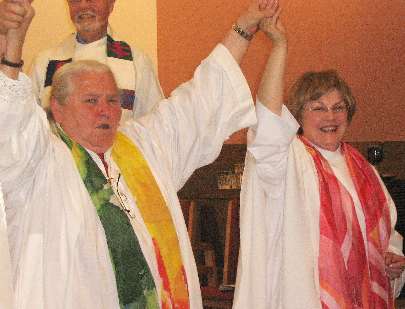Text: Revelation 22:1-6 (7-11) 12-20
“I am coming soon”
Grace, mercy, and peace to you from God our Father, and from our Lord and Savior, Jesus Christ, amen. The text for our sermon this morning comes from the Epistle which was read earlier.
“In the beginning, God created the heavens and the earth.” These are familiar words to us all. At the conclusion of every day, we hear these words: “And God saw that it was good.” Adam and Eve came into the scene and all was good until the serpent came into the picture. Once the interaction between Adam and Eve and the serpent took place, all was no longer good. We jump ahead to the birth of Christ. Christ was born, grew in stature of a man, died, rose again, and ascended into heaven for one reason: because you and I are sinners.
Just a few days ago, we remembered Christ’s ascension into heaven. It is there that he sits at the right hand of God the Father Almighty. From thence he will come to judge the living and the dead. In our text for today, we see what is to come following the resurrection and ascension of our Lord and Savior, Jesus Christ: the second coming.
In the beginning of our text for today, John sees another depiction of the new heaven and earth, this time reminiscent of the Garden of Eden. We see the river of the water of life and the tree of life. “The tree of life” first appeared early on in Genesis. Among the many trees God created, He made in the middle of the Garden of Eden “the tree of life” and “the tree of knowledge of good and evil.” Adam and Eve rejected God’s command not to eat of the tree. They turned away from His face—the act of disobedience. They feared His presence because they feared His wrath. They were lied to by Satan, and were tricked into thinking that they could be independent of God. They believed they didn’t need Him or His Word. They embraced the lie and the death that came with it. Because Adam and Eve ate of the tree of knowledge in disobedience to God’s command, they were driven from the garden. Because they sinned, we too have sinned. Their sin became our sin. The psalmist David knew of his sinful nature and from where it came from: “Behold, I was brought forth in iniquity, and in sin did my mother conceive me.” This “tree of life” which John sees standing before him is what would come to save all of mankind: Jesus Christ.
John, while in exile on the island of Patmos, received the revelation from Jesus Christ which said not once, not twice, but three times that “I am coming soon.” We have all seen the first coming of our Lord and Savior, Jesus Christ. He came to us as a baby, weak and frail. He grew up to be a man with a mission. His mission was not His own, but His Fathers: to save all of mankind from eternal death. Through His coming, death has been defeated, once and for all. Through His life, death and resurrection, we have received forgiveness of sins, life and salvation.
Here we stand; the Sunday after the Ascension, seven Sundays after Easter. Announcements of triumph have been sounding all over the place. The Gospel’s content has never been clearer than in this text which insists that Jesus is the “Alpha and Omega, the first and the last, the beginning and the end.” There it is before you, that powerful message that forms the very spine of life: God in Christ affirming again that He will be our God from the beginning to the end of it all.
From the beginning, He has been our God. He was our God in the Garden of Eden, giving to us all that we needed to survive. He was our God when Adam and Eve were barred from the Garden because of their disobedience. When they were barred, we didn’t see an angry God. On the contrary, we saw a God who gave us the first words of Gospel truth: “I will put enmity between you and the woman, and between your offspringand her offspring; he shall bruise your head, and you shall bruise his heel.”He was our God when He sent His only-begotten Son to live and die for us. He was our God at our baptism, when we were made His children. He will continue to be our God, even to our last days and beyond, when He calls us to our heavenly home. John records for us, “They will see his face, and his name will be on their foreheads.”We have the promise of God Himself that He will be our God and we will indeed be His people.
Here it was where and when Jesus shed His holy, precious blood, so that men, women, children and infants might “have washed their robes and made them white in the blood of the Lamb.”Indeed, “blessed are those who wash their robes, that they may have the right to the tree of life and that they may enter the city by the gates.”Christ is the Fruit of the Tree of Life and whoever eats His flesh and drinks His Blood will live forever.
God draws us in the flesh of Jesus Christ through His body and blood. He draws us through His Word, which calls and enlightens us. We are united in the flesh of Christ. We are gathered in one place: in Christ. God sustains us with the one river of the waters of life and the one tree of life.
We are gathered to share in His blessings. We receive the waters from the river: the waters of Holy Baptism, just as young Trey did this morning. Jesus Christ has invited Trey, us, and all sinners to quench our spiritual thirst: “And let the one who is thirsty come; let the one who desires take the water of life without price.”
We receive the healing fruit from the tree: the Lord’s Supper, which you will partake of in just a few moments. Here, around His Word and His Sacraments, we are gathered in the true worship of God — “one Lord, one faith, one baptism.”
There it stands at the Bible’s opening verses, the picture of a loving God, tenderly authoring life bringing about man’s genesis; the God who makes covenant promises. In today’s text, the curtain rings down on the Bible’s witness and the message at the end is the same as at the beginning: God announcing that He is with us at the beginning and at the end and with each intervening step!
Jesus gives to us unity in His promises. His Baptism, death, resurrection, and ascension are ours as well. We are baptized into His name. We die in His name, as Christians. We are promised the resurrection on the last day, where we will be raised in all holiness and righteousness, where we will be with God and the Lamb forever. We will see Him face-to-face on the Last Day and in eternal life. We will again possess the image of God, lost when Adam and Eve disobeyed God in the Garden of Eden, restored when Christ died for your sins and mine, when He took our place and elevated us to full sonship, made holy by His blood.
While waiting in expectation for the second coming of Christ, we invite, proclaim and pray. We invite others to share in Christ and the waters of life. We proclaim Christ’s Word faithfully. The Lord of life, the root and offspring of Davis says “Come. Come you who are thirsty, accept the water of life, a free gift to all who desire it.” We pray, “Come, Lord Jesus! Come, Lord Jesus, and bring us to the new Eden, around the tree of life, forever more together.” In Jesus’ name, amen.
Now the peace of God which passes all understanding, keep your hearts and minds in Christ Jesus. Amen.
Easter 7C: May 20, 2007 – “I am coming soon”
 Sunday marked an interesting day up in Canada: Canadian Catholics have “
Sunday marked an interesting day up in Canada: Canadian Catholics have “